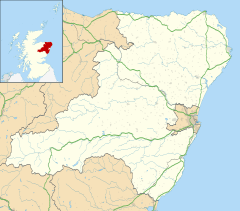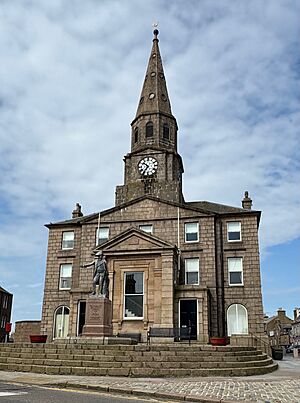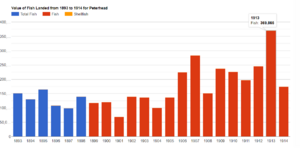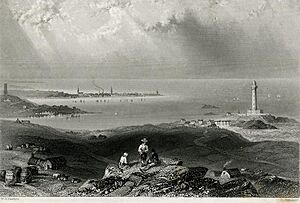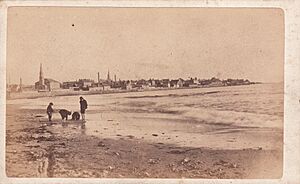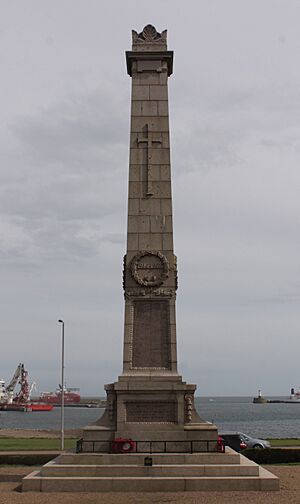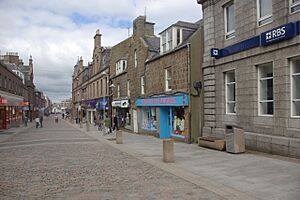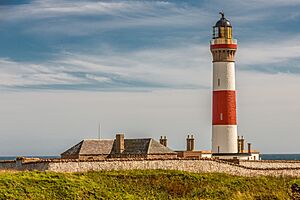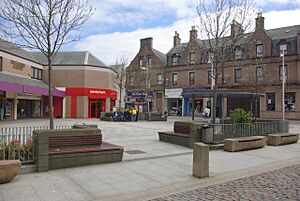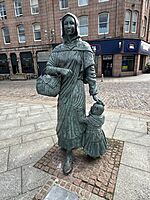Peterhead facts for kids
Quick facts for kids Peterhead
|
|
|---|---|
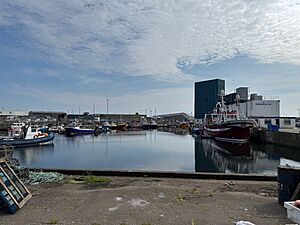 Peterhead's North Harbour |
|
| Population | 19,060 (2020) |
| OS grid reference | NK135465 |
| • Edinburgh | 120 miles (193 kilometres) |
| • London | 420 mi (676 km) |
| Council area | |
| Lieutenancy area | |
| Country | Scotland |
| Sovereign state | United Kingdom |
| Post town | PETERHEAD |
| Postcode district | AB42 |
| Dialling code | 01779 |
| Police | Grampian |
| Fire | Grampian |
| Ambulance | Scottish |
| EU Parliament | Scotland |
| UK Parliament |
|
| Scottish Parliament |
|
Peterhead is a town in Aberdeenshire, Scotland. It is the biggest town in the area. In 2011, about 18,537 people lived there. Peterhead is also the largest fishing port in the United Kingdom. This means more fish are brought ashore here by UK boats than anywhere else.
Peterhead is located at the most eastern point of mainland Scotland. People often call it The Blue Toun (or "The Bloo Toon" locally). People from Peterhead are known as Bloo Touners. They are also called blue mogganers. This name probably comes from the blue woollen stockings, called moggans, that fishermen used to wear.
Contents
A Look Back in Time
Ancient History
When the town's landfill was expanded in 2002 and 2003, archaeologists found some interesting things. They discovered old stone tools from the late Bronze Age. They also found a burial mound with tools from the late Neolithic and early Bronze Age. Some very old stone tools were found from the Mesolithic period. These finds show that people have lived in the Peterhead area for more than 5,000 years!
How Peterhead Started
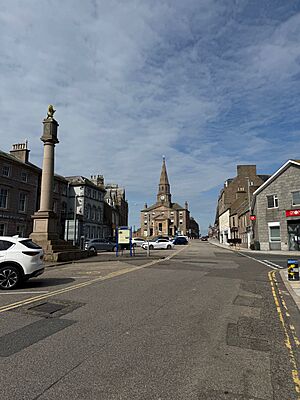
Long ago, the land where Peterhead now stands belonged to Deer Abbey. In 1560, Mary, Queen of Scots, gave the land to Robert Keith. Peterhead was officially started in 1593 by George Keith, 5th Earl Marischal. It was planned as a new settlement.
At first, only 56 people lived in the town. They built their homes along Seagate. This area was between the pier of Port Henry and the Quinzie. The Queenie was a path of big stones that connected the islands of Keith Inch and Greenhill to the mainland. It was only covered by high tides.
Today, the Queenie Bridge connects Bridge Street and Greenhill Road. It opened in 1954. Building Port Henry in 1593 helped Peterhead grow as a fishing port. It also became a place for trade. Port Henry is the oldest of Peterhead's three harbours.
Peterhead grew uphill from the shore towards Longate. Longate was the main part of town until Broad Street was built later. The harbour was improved many times over the years. By 1680, Peterhead was known for having "one of the best fishings on the north coast."
The 1700s
In 1715, James Francis Edward Stuart, who was a prince, came to Peterhead. He stayed in an old house in Longate. The town supported him, but because of this, the Keith family lost their land in 1716.
In 1728, a report said Peterhead had about 230 families. The people were described as "sober and courteous." The harbour became very important. In 1738, sailors from Leith said that Peterhead's harbour was "the best situate of any place in Scotland."
In 1775, the land was given to the town's Committee of Feuars. A new Peterhead Town House was built in 1788. Around this time, new, nice houses were built for visitors and sea captains. Fishermen started moving to Roanheads. Some of the old houses there with special tiled roofs might still be original. From 1788, Peterhead became very important for whaling. It grew to be Britain's biggest whaling port.
The 1800s
In 1815, Peterhead had 72 ships working from its port. By 1850, this number grew to over 400! This was before herring fishing became very popular.
The North Harbour and the dry dock were built between 1818 and 1822. They were improved later. A canal was built in 1849. The south and west piers of North Harbour were built in 1855. The middle part of North Harbour was built in 1872.
A lifeboat station was set up in 1865 to help people at sea. Peterhead convict prison opened in 1888. It became known as one of Scotland's toughest prisons.
The 1900s and 2000s
The South Harbour was made deeper between 1906 and 1908. The Harbour of Refuge was started in 1886. It was built using prisoners from the jail.
The current harbour has two huge walls called breakwaters. They protect an area of about 300 acres in Peterhead Bay. The south breakwater is about 2,700 feet long. It was built between 1892 and 1912 by prisoners. This breakwater gave Peterhead an advantage over other fishing ports. The north breakwater is about 1,500 feet long. It was built between 1912 and 1956.
Peterhead supported the Jacobite rebellions in 1715 and 1745. During World War II, Peterhead was bombed 28 times by German planes. This made it the second most bombed place in Britain after London. It was bombed so much because it was the first town German bombers saw when flying towards Scotland.
In the 1970s, Peterhead grew again. It became a big service centre for the oil industry. A gas terminal was also built nearby. Since the 1990s, some companies have closed. However, Peterhead still has many different types of businesses. These include food processing, textiles, and services. Fishing is still very important. In 2023, over 193,000 tonnes of fish and shellfish were landed in Peterhead. This was worth about £232 million. The Peterhead Port Authority plans to make the harbour even bigger.
Peterhead's port is still the largest in the United Kingdom for fish landings. In 2019, Peterhead Port caught 132,000 tonnes of fish.
Famous Buildings
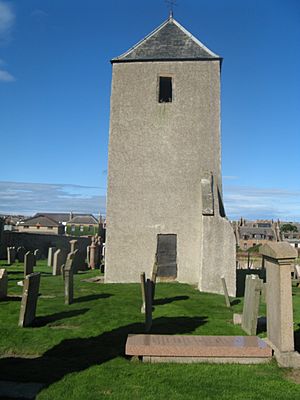
Peterhead has many important historical buildings. These are called "listed buildings." Three of the most important are Buchan Ness lighthouse, Old St Peter's Church, and the Old Parish Church. Most of these buildings are on streets near the harbour. These include Harbour Street, Broad Street, and Queen Street.
The oldest building in Peterhead is the 16th-century Fish-House. It is also called the Salmon House.
- Harbour Street
Harbour Street was planned in 1739. It is home to the Peterhead office of Marine Scotland.
- 1 Harbour Street, built in the late 1700s.
- Broad Street
Broad Street was once the centre of the town in the 1800s. It had the Peterhead Town House and Arbuthnot House. It was also lined with nice houses, hotels, and banks. The area between Broad Street and the harbour has some of the most beautiful old streets in Scotland. There are 22 listed buildings on Broad Street, including:
- Arbuthnot House, built in 1805.
- Reform Monument, built in 1833.
- Peterhead Town House, built in 1788.
- Merchant Street
- 10 Merchant Street, built around 1800.
- St. Peter's Episcopal Church, 22 Merchant Street, built in 1814.
- Statue of Field Marshal Keith, built in 1868.
People of Peterhead
In 2016, Peterhead had about 19,270 people. This makes it the biggest town in Aberdeenshire. Most people speak English. However, more than half of the people (56.4%) can also speak Scots.
Community Challenges
Like many towns, Peterhead faces some challenges. Some parts of the town centre, especially near the harbour, have lower rankings in areas like jobs, education, housing, and safety. This means people in these areas might have fewer opportunities. However, other parts of Peterhead, like Ugieside and Peterhead Links, have much higher rankings. This shows that different areas of the town have different experiences.
Learning in Peterhead
Peterhead Academy
Peterhead Academy is a large school with about 1,300 students. The school is divided into six houses: Arbuthnot, Buchan, Craigewan, Grange, Marischal, and Slains. These names are all linked to areas around Peterhead. Students come from nearby villages like Boddam and Cruden Bay. The school's motto is Domus Super Petram Aedificata. This means "A House Built on a Rock."
The school building has two main parts. The older part was built before World War II. The newer part has a unique hexagonal design. This newer section also shares space with the town's community centre, theatre, and sports facilities.
Primary and Special Schools
Peterhead has six primary schools: Clerkhill, Buchanhaven, Meethill, Dales Park, Central, and Burnhaven. There is also a special school called Anna Ritchie. It helps students with specific learning difficulties, autism, and other disabilities.
Peterhead in the News
Newspapers
News about Peterhead can be found in The Press and Journal and the Buchan Observer. The Buchan Observer, known locally as the Buchanie, has been printed in Peterhead since 1863.
Radio Stations
Peterhead has several radio stations. These include BBC Radio Scotland (93.1 FM), Northsound 1 (103.0 FM), and Original 106 (106.3 FM). There is also Greatest Hits Radio North East Scotland and Coast Radio (101.2 FM). Coast Radio took over from Waves Radio in 2023.
Television
Local news and TV shows are provided by BBC Scotland and STV North.
Plans for the Future
In 2008, a plan called Blueprint for Growth was made for Peterhead. This plan aimed to expand the town beyond its bypass. It included building 4,500 new homes, four new primary schools, a new secondary school, and a new hospital. The goal was to bring 9,000 more people to the town over 20 to 25 years.
In 2016, the Aberdeenshire Council started a new plan for Peterhead. This plan focuses on improving Peterhead's economy, bringing communities together, and making the town centre better.
Lighthouses of Peterhead
Peterhead has four lighthouses. Two of them are still working today.
- Buchan Ness lighthouse (built 1827) is still active. It is on a small island that you can reach by a bridge.
- South Breakwater lighthouse (built 1833) is also active. It is the most eastern lighthouse on mainland Scotland.
- Harbour South lighthouse (built 1849) is no longer active. It was moved in 2015 to a new spot.
- Harbour North lighthouse (built 1908) is also no longer active.
Visiting Peterhead
Peterhead has many things for visitors to see. These include its harbours, old buildings, and the Peterhead Prison Museum. Recently, efforts have been made to bring cruise ships to the harbour. There are also plans to improve existing attractions and make the town more appealing.
The old Victorian-era prison, HM Prison Peterhead, is now a museum. It closed when a new, bigger prison was built.
Peterhead Trail
The Peterhead Trail is a fun way to explore the town. It has 21 story boards placed around Peterhead. You can visit these boards by following three different routes:
- The red route (about 1.25 miles long)
- The blue route (about 3.5 miles long)
- The green route (about 1.9 miles long)
The trail starts at the Muckle Kirk. It takes you through many interesting streets and past important landmarks. These include Marischal Street, Harbour Street, and Seagate. The blue route goes along the shore and past the old Fish-House. The green route explores the bay area, including the Scottish Maritime Academy and the Prison Museum. All routes end at the Arbuthnot Museum.
Sports in Peterhead
Peterhead F.C. is a professional football club. They play in the League Two. They won the League Two championship in 2013–14 and 2018–19. The club also reached the final of the Scottish Challenge Cup in 2015–16.
Peterhead Golf Club is said to be the 18th oldest golf club in the world. It is located near the River Ugie and the North Sea. It has an 18-hole course and a 9-hole course.
Peterhead RFC is a rugby team that plays at the Lord Catto playing fields.
Getting Around Peterhead
Roads
Today, Peterhead is mostly surrounded by the A90. This road runs along the west side of the town. It connects Peterhead to Fraserburgh in the north and Edinburgh in the south. Other main roads connect to the A90 from different parts of Peterhead.
- Bus Services
Peterhead has many bus services that go within the town and to other places.
- In-town services (run by Stagecoach Bluebird) include routes 82, 83, and 84.
- Out-of-town buses connect Peterhead to many nearby villages and towns. These include Aberdeen, Fraserburgh, Ellon, and Boddam.
- Some bus services, like the 747, go to Aberdeen Airport.
- A special "dial-a-bus" service called A2B is available on weekdays.
Air Travel
The closest airport with regular flights is Aberdeen Airport. There is also a heliport at the eastern end of the old RAF Buchan air base. Some recreational flying also happens there.
The RAF Buchan air base was a Royal Air Force station from 1952 to 2004. It is now a Remote Radar Head called RRH Buchan.
Trains
Peterhead is quite far from a railway station. The closest one is in Aberdeen, about 32 miles away. Peterhead used to have two train stations: Peterhead railway station and Peterhead Docks railway station. Passenger trains stopped running in 1965, and freight trains in 1970. There is now talk about possibly reopening the train line from Aberdeen to Fraserburgh and Peterhead.
Twin Town
Peterhead is twinned with:
- Ålesund, Norway
Famous People from Peterhead
Many notable people have come from Peterhead, including:
- Thomas Abernethy, an explorer of the Arctic and Antarctic.
- Jon S. Baird, a film director.
- Eric Temple Bell, a mathematician and science fiction writer.
- James Keith, a soldier.
- Peter Mullan, an actor and filmmaker.
Images for kids
See also
 In Spanish: Peterhead para niños
In Spanish: Peterhead para niños
 | Kyle Baker |
 | Joseph Yoakum |
 | Laura Wheeler Waring |
 | Henry Ossawa Tanner |


